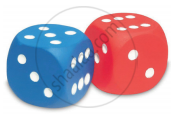Advertisements
Advertisements
प्रश्न
A box contains 20 cards numbered from 1 to 20. A card is drawn at random from the box. Find the probability that the number on the drawn card is divisible by 2 or 3
उत्तर
Total number of outcomes = 20
The numbers from 1 to 20 which are divisible by 2 or 3 are 2, 3, 4, 6, 8, 9, 10, 12, 14, 15, 16, 18 and 20.
So, the favourable number of outcomes are 13.
∴ P(number on the drawn card is divisible by 2 or 3) =\[\frac{\text{ Favourable number of outcomes }}{\text{ Total number of outcomes }} = \frac{13}{20}\]
APPEARS IN
संबंधित प्रश्न
Three different coins are tossed together. Find the probability of getting exactly two heads.
Two coins are tossed simultaneously. Write the sample space (S), n(S), the following event A
using set notation and n(A), where ‘A is the event of getting at least one head.’
An integer is chosen at random between 1 and 100. Find the probability that it is
1) divisible by 8.
2) not divisible by 8.
Cards bearing numbers 2, 3, 4, ..., 11 are kept in a bag. A card is drawn at random from the bag. The probability of getting a card with a prime number is
A box contains 80 discs which are numbered from 1 to 80. If one disc is drawn at random from the box, find the probability that it bears a perfect square number.
Solve any two of the following.
If two coins are tossed simultaneously, find the probability of getting a head on both the coins.
A piggy bank contains hundred 50 paise coins, fifity ₹1 coins, twenty ₹2 coins and ten ₹5 coins. If it is equally likely that one of the coins will fall out when the bank is turned upside down, find the probability that the coin which fell will be a ₹1 or ₹2 coin
A box contains 20 cards numbered from 1 to 20. A card is drawn at random from the box. Find the probability that the number on the drawn card is a prime number
Cards numbered from 11 to 60 are kept in a box. If a card is drawn at random from the box, find the probability that the number on the drawn card is divisible by 5
Which of the following cannot be the probability of an event?
Two numbers 'a' and 'b' are selected successively without replacement in that order from the integers 1 to 10. The probability that\[\frac{a}{b}\] is an integer, is
17 cards numbered 1, 2, 3, 4, .... ,17 are put in a box and mixed thoroughly. A card is drawn at random from the box. Find the probability that the card drawn bears an odd number.
A game of chance consists of spinning an arrow, which comes to rest pointing at one of the numbers 1, 2, 3, 4, 5, 6, 7, 8 and these are equally likely outcomes. Find the probability that the arrow will point at any factor of 8.
A box contains 80 discs, which are numbered from 1 to 80. If one disc is drawn at random from the box, find the probability that it bears a perfect square number.
A die is thrown once. The probability of getting an even number is
If two coins are tossed, then find the probability of the event: No heads turns up.
A die is thrown, find the probability of getting:
a number not greater than 4.
Two dice are rolled, find the probability that the sum is equal to 1
Frame two problems in calculating probability, based on the spinner shown here.
A coin is tossed two times. The number of possible outcomes is ______.
